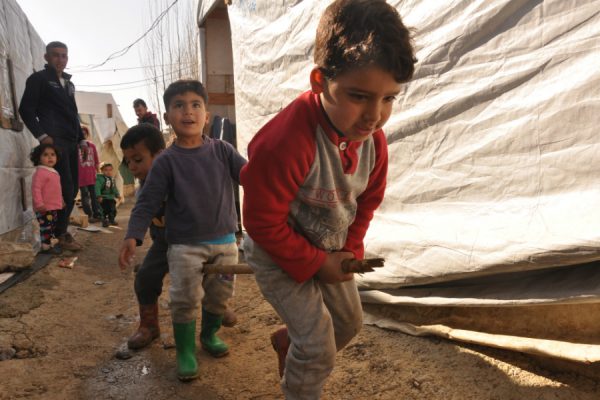 As the Syria war draws to an end and the barrel bombs stop terrorizing the country, the torture and mistreatment of returnees are ramping up.
As the Syria war draws to an end and the barrel bombs stop terrorizing the country, the torture and mistreatment of returnees are ramping up.
Lebanese political leaders have increasingly called on the international community to facilitate refugee returns, with some arguing that much of Syria is now secure. President Michel Aoun used the platform of last month’s Arab Economic and Social Development summit held in Beirut to do so; and Foreign Minister Gebran Bassil, at a meeting in Brussels earlier this month, called on the European Union to “start redirecting the aid sent for refugees staying in Lebanon to be used to support a safe and dignified return for those who can.”
But in some cases, the SAWA report argued, those returns may be premature. Researchers spoke directly to two families who reported having returned to Lebanon after making unsuccessful return journeys to Syria. The report also contained anecdotal information on a third case.
Elena Hodges, a policy, research and advocacy officer with SAWA, said that finding those cases had not been the main objective of the report and that the information was not comprehensive. “There are more of these stories,” she said. “They’re not represented in this report, and we don’t know what the incidence is in terms of percentage of returnees.”
One family from Raqqa told researchers they had sold their belongings in Lebanon and returned to Syria with their six children in January 2018, after the wife became sick and the family was unable to meet her medical expenses, the report said. Upon arriving back in their city, they found the extent of the destruction to be worse than they had been led to believe – their house was partially collapsed and looted, with roving militias occupying the area. Discouraged, they borrowed money and returned to Lebanon.
“We lost everything by going back to Raqqa,” the report quoted the father of the family as saying. “It cost $400 in transport to and from Raqqa within Syria, $233 to rent the house outside Raqqa, hundreds of dollars for price-inflated food and water, and $900 for the smuggler. We sold everything before returning, so when we fled back to Lebanon we had nothing.”
Another woman, a widow, told the NGO that she had left her children in a neighbor’s care in Lebanon and returned to Homs to see if conditions were ready for return. She found her house intact but occupied by squatters who refused to let her in. On top of that, she was slapped with about $200 in phone bills and $2,500 in unpaid electricity bills that accumulated over the six years she and her children had been in Lebanon.
Although the woman had documents proving ownership of the house, she told researchers she felt helpless to do anything: “The authorities are part of the problem, so how could I go to them asking for justice?”
She too returned to Lebanon, traveling via a smugglers’ route through the mountains as she had been banned from entering Lebanon for five years when she returned to Syria.
In a third case, a woman in her 60s attempting to return to Damascus had reportedly been detained at the border and jailed for 45 days for reasons that were unclear, but possibly related to her grandson’s involvement in the Free Syrian Army, the report said, citing another refugee who knew the woman. Upon her release, the woman reportedly fled back to Lebanon, but Hodges said the researchers were not able to reach her to confirm the story.
At a forum at the American University of Beirut’s Issam Fares Institute, where the report was discussed Wednesday, Amnesty International researcher Diana Semaan said refugees in Lebanon have difficulty getting accurate information on conditions in Syria.
The U.N. and international NGOs have not been able to get permission to access returnees in some areas, and Syrians inside the country may be hesitant to share negative information with friends and family in Lebanon, concerned about surveillance of their communications, she said.
“Refugees may have relatives inside, but the relatives are so afraid to speak about the situation that they give them false information,” Semaan said. “There’s serious misinformation coming out from inside Syria that doesn’t allow refugees to make an informed decision.”
Prime Minister Saad Hariri on Thursday stressed that he and his political movement will not accept to “hand over” the Syrian refugees to Damascus “as hostages.”
As for the thorny issue of Syrian refugees, Hariri said that the interest of the country lies in their return to their country in a “dignified and safe manner.”
Lebanese Minister of Foreign Affairs Gebran Bassil called on Damascus to improve conditions currently keeping Syrian refugees in Lebanon from returning home. According to most estimates, Lebanon has taken in more than 1.5 million refugees since the eruption of Syria’s civil war in 2011. Only about one million of these are registered with the United Nations High Commissioner for Human Rights (UNHCR), meaning that thousands of families continue to live without support.
Haid Haid, a researcher in the Middle East and North Africa Program at the London-based Chatham House think tank, was quoted as saying by local media “most [Lebanese] officials see the refugees as a financial burden and some see them as a clear security threat. Their main concern is to get rid of those refugees despite what the consequences of such actions might be for them back in Syria.
“The Lebanese,” he continued, “have always claimed that if people do not want to go back voluntarily, they would not be forced to do so. In other words, they have conditioned the return of the refugees on their safety in Syria. And this is the main issue.”
 Lisa Abou Khaled, a UNHCR communications officer, told the local media that “close to 90 percent of Syrian refugees in Lebanon have expressed a wish to ultimately return to their home country. To enable the vast majority of refugees to feel confident, it is important to work on addressing the obstacles people see to their return and this is what UNHCR is doing by engaging all concerned authorities in Syria, regionally and globally.
Lisa Abou Khaled, a UNHCR communications officer, told the local media that “close to 90 percent of Syrian refugees in Lebanon have expressed a wish to ultimately return to their home country. To enable the vast majority of refugees to feel confident, it is important to work on addressing the obstacles people see to their return and this is what UNHCR is doing by engaging all concerned authorities in Syria, regionally and globally.“If you look at all the reports,” he concluded, “they all say that it’s still not safe for refugees to return for a variety of reasons, the biggest one being that the regime is still targeting those who fled.” Abou Khaled added
FP/ DS

Leave a Reply
You must be logged in to post a comment.